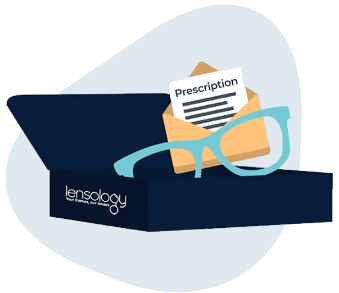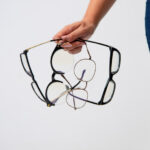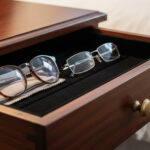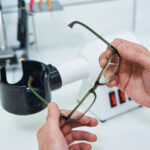
Clear vision is crucial when it comes to driving — not only for your comfort and safety but also for the safety of others. This is easier on bright sunny days, but if you’re driving at night with low light levels, it can be difficult to distinguish colour, depth perception, and peripheral vision.
Another big issue for night drivers is the blinding glare and reflection from street lights and other road users’ headlights, which can disrupt your line of sight. However, you can support your vision when driving at night in many ways, such as choosing appropriate glasses.
What are night driving glasses?
Night driving glasses are specialised glasses, designed to improve visibility and reduce glare from oncoming headlights and streetlights when driving at night. They typically have yellow-tinted lenses, which help increase contrast and clarity in low-light conditions.
How do night driving glasses work?
Finding the right type of night driving glasses depends on your optical requirements, style preference, and comfort. It’s also more to do with the lens. Here are our recommendations for some of the different types of lenses that could benefit you when driving at night:
Yellow Lenses
Yellow-tinted lenses are used for driving glasses as they help reduce the glare from lights such as headlights or streetlights. They also help define contrasts in colour, which aids with depths and distances. As a bonus, they block UV and blue light, too, which means your eyes are protected and your vision undisturbed.
Anti-glare driving glasses
Anti-glare lenses, also known as polarised lenses, are a key addition to any pair of glasses, especially when driving at night. Our eyes naturally adapt to different conditions, but this constant adjustment to streetlights, headlights, reflections off road signs, etc., can impact our vision and increase eye strain and headaches.
A simple and highly effective solution to reflective light is through anti-glare lenses. These are made to stop glare, creating a sharper view and a more comfortable driving experience. The anti-glare coating can also be added to your existing prescription and non-prescription glasses.
Bifocal or Varifocal Lenses
Driving can be difficult for people who require multiple optical prescriptions; you might be able to see the road sign ahead, but your dashboard is blurry. Rather than swapping your glasses (absolutely not recommended while driving!) or wearing contact lenses and glasses to cover all bases, opt for a bifocal or varifocal lens. These are designed to hold short, long and intermediate prescriptions, meaning you can wear one lens to meet all your driving visual needs.
Transitions® Lenses
Transitions® lenses are becoming a popular option for drivers. The lenses instinctively adapt from clear to dark depending on the light available, protecting your eyes at all times without you having to lift a finger. Our Transitions® XTRActive® new generation range is the best option available, as they work behind the windscreen, helping protect your eyes from sunlight and glare at all times.
Do I need night driving glasses?
If you drive a lot at night, your eyes may be used to adapting to the change in conditions, but you can still be caught off-guard, and it never hurts to be prepared. Choosing appropriate lenses can also support your eye health by reducing eye strain, which can lead to tiredness, headaches and wrinkles!
Night glasses, especially those with anti-glare or Transition lenses, increase visual clarity and reduce interruptions from bright lights. They ultimately make you feel more confident and comfortable driving at night.
Eye health conditions to consider
When it comes to driving, particularly at night, you should also consider any health factors that may impact your ability to drive, such as:
Ageing eyes (Presbyopia)
– Our eye health will inevitably deteriorate, and our reactions will slow down as we age. We also require our eyes to absorb more light for clearer vision.
Nyctalopia
– This is also known as night blindness. It doesn’t mean you are completely blind at night, but you do struggle to see in darker settings.
Myopia
– Myopia is an eye condition in which people struggle to see objects far away, which becomes more difficult in low-light conditions.
Glaucoma
– Glaucoma is a condition that reduces peripheral vision due to a build-up of fluid in the eye, which damages the optic nerve.
Cataracts
– With cataracts, a cloudy layer forms over the eye, blurring vision and making it hard to see during the day or night.
If you feel you are suffering from any of these conditions, we recommend speaking with your optician to discuss the best option for you.
Do night driving glasses help?
As we’ve highlighted, night driving glasses have pros and cons. Yellow-tinted lenses make dark areas of the road ahead harder to see, so they are not recommended due to the limited visibility they provide.
If you do not wear glasses or have a prescription, it’s best to use no glasses or choose clear polarised lenses to prevent glare. If you wear glasses, it’s best to stick with your prescription glasses and invest in anti-glare or polarised lenses. They should make you feel more comfortable and confident in spotting hazards and driving in difficult night-time conditions.
Tips to improve your vision when driving at night
Along with finding the right night driving lenses to match your needs, there are some quick fixes you can act on now to instantly improve your sight:
- Ensure your glasses prescription is up to date
- Have regular eye tests
- Apply an anti-glare finish to your lenses
- Wipe your lenses; smudges can amplify glare
- Clean your car windows to remove streaks or watermarks
- Check your windscreen wipers
- Keep your headlights clean
- Lower your dashboard lights
So, what are the best glasses for driving at night?
There is no scientific evidence that yellow-tinted driving glasses improve your night vision when driving, but some glasses wearers may feel they benefit from them.
At Lensology, we advise using anti-glare glasses when driving to reduce glare and filter out blue light. These can take you from day to night and have several subsequent health benefits, including decreased fatigue and eye strain.
Why Use Lensology
You can upgrade your lenses with anti-glare for only £31.90 with Lensology. Through our free postal service, we can fit non-prescription and prescription anti-glare lenses into frames of your choice. Once you receive your pack, pop your frames in the post with your prescription and additional coating options. When they reach our lab, our expert technicians, with industry-leading techniques and care, will create your perfect lenses and get them back to you within a few days.






